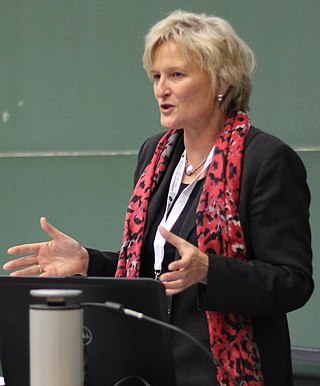Related Research Articles
Richard Simon Levy was a professor of Modern German History at the University of Illinois at Chicago from 1971 until his retirement in 2019. He is most noted for his contributions to history in debunking several antisemitic myths, as well as uncovering many others. Levy was featured on a TV documentary concerning The Protocols of the Elders of Zion: A Deadly Deception, which aired on the History Channel on May 11, 1999. Levy died of prostate cancer at his home on June 23, 2021, at the age of 81.

Ute Frevert is a German historian. She is a specialist in modern and contemporary German history, as well as social and gender history. In January 2008, she was appointed managing director of the Max Planck Institute for Human Development and director of the Institute's Center for History of Emotions in Berlin.

Sedantag was a semi-official memorial holiday in the German Empire celebrated on the second day of September to commemorate the victory in the 1870 Battle of Sedan. After the outbreak of the Franco-Prussian War a few weeks earlier, French emperor Napoleon III and his army were taken prisoner in the fortress of Sedan by Prussian troops, a major step to eventual victory.
Wilfried Loth is a German historian and political scientist.

Rebekka Habermas is a German historian, professor of modern history at the University of Göttingen, in Germany. Habermas has made substantial contributions to German social and cultural history of the 19th century.
Professor Andreas Gestrich is a German historian who has been director of the German Historical Institute London since September 2006.
Georg Gerson Iggers was an American historian of modern Europe, historiography, and European intellectual history.

Simone Lässig is the director of the German Historical Institute Washington DC and a cultural and social historian of the nineteenth and twentieth centuries.
Ewald Frie is a German historian and biographer at the University of Tübingen. His research interests include German history of the 18th, 19th and 20th centuries, European nobility, poverty and the welfare state, and Australian history.

Norbert Finzsch as Norbert Rollewitz is a German historian.
Lutz Raphael is a German historian and historiographer. He is a professor at the University of Trier.

Walter Hinck was a German Germanist and writer. He was professor of German literature at the University of Cologne from 1964 to 1987.
Mark Mersiowsky is a German historian and diplomatist. He is professor of History of the Middle Ages at the University of Stuttgart.
Notker Hammerstein is a German historian. His research interests are mainly in the field of University history and history of science as well as the history of the Holy Roman Empire of the German Nation.
Martina Wagner-Egelhaaf is a Professor of German Literature at the University of Münster, Germany, and holds a chair in German Literary History with special focus on Modernity and Contemporary Literature. Her fields of research include Autobiography/Autofiction, Literary Theory, Rhetoric, Literary and Cultural Studies, Gender Studies, the relation of Religion, Politics and Literature as well as Law and Literature.
Rudolf Vierhaus was a German historian who mainly researched the Early modern period. He had been a professor at the newly founded Ruhr University Bochum since 1964. From 1971, he was director of the Max-Planck-Institut für Geschichte in Göttingen. He became known for his research on the Age of Enlightenment.
Barbara Vogel is a German historian.
Hans Medick is a German historian.
Anne Bohnenkamp-Renken is a German academic who has served as the director of the Freies Deutsches Hochstift since 2003. She received the 2022 Hessian Cultural Prize for both her direction of the Hochstift and her personal academic work.
Hartmut Lehmann is a German historian of modern history who specializes in religious and social history. He is known for his research on Pietism, secularization, religion and nationalism, transatlantic studies and Martin Luther. He was the founding director of the German Historical Institute Washington DC and was a director of the Max Planck Institute for History. He is an emeritus honorary professor at Kiel University and the University of Göttingen.
References
- 1 2 "Dr.Olaf Blaschke". Gesellschaftliche Abhängigkeiten und soziale Netzwerke. Universität Trier – Forschungscluster. Archived from the original on 19 February 2014. Retrieved 8 September 2016.
- 1 2 3 4 5 Kilian Schultes (compiler) (23 June 2012). "Prof. Dr. Olaf Blaschke". Universität Heidelberg. Retrieved 8 September 2016.
- 1 2 3 "Visiting Scholars" (PDF). St Catharine's College Society Magazine. 2002. p. 7. Retrieved 8 September 2016.
- ↑ Olaf Blaschke (31 December 1999). Katholizismus und Antisemitismus im Deutschen Kaiserreich (Kritische Studien zur Geschichtswissenschaft). Vandenhoeck & Ruprecht. ISBN 978-3-525-35785-9.
- ↑ Johannes Heil. Reviewed Work: Katholizismus und Antisemitismus im Deutschen Kaiserreich. Kritische Studien zur Geschichtswissenschaft, 122 by Olaf Blaschke. p. 160. JSTOR 42943084.
{{cite book}}:|work=ignored (help) - 1 2 "Prof. Dr. Olaf Blaschke – Prof. für Neuere und Neueste Geschichte". Dr. Thomas Tippach i.A. Historisches Seminar, Westfälische Wilhelms-Universität Münster. Retrieved 9 September 2016.
- ↑ "Prof. Dr. Olaf Blaschke: Geschichte des 19./20.Jahrhunderts unter besonderer Berücksichtigung der Theorie und Methodik der Geschichtswissenschaft". Aktuelles 01.04.2014. Dr. Thomas Tippach i.A. Historisches Seminar, Westfälische Wilhelms-Universität Münster. Retrieved 9 September 2016.